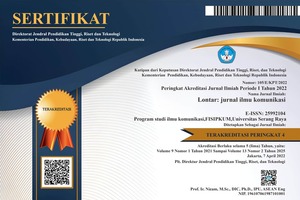Proses Penetrasi Sosial Antar Pemain Pada Game Mobile Legends
DOI:
https://doi.org/10.30656/lontar.v6i2.950Abstract
This study discusses the stage of development of social penetration relationship in Mobile Legends game which is seen through three factors of relationship development. The stage of interpersonal relationship development is the stage where two individuals who have not known each other to have an intimate relationship. Mobile Legends is a mobile game that is played in groups and requires interaction to work together. This interaction can be used to build interpersonal relationships. The theory used in this research is Social Penetration Theory. Social Penetration Theory is used to explain how the development of interpersonal relationships between Mobile Legends players. This research uses qualitative approach with constructivist paradigm. This research method is depth interview, observation, and literature study. The study looks at the stage of relationship development through three factors that influence the escalation of relationships, namely the attitude of trust, supportive attitude, and open attitude between players Mobile Legends. Open attitudes, supportive attitudes, and trust among Mobile Legends players have reached the affective exchange stage, that is, they are already open about personal information, romance, and family.Keywords: Developmental Stage of Interpersonal Relationship, Social Penetration Theory, Mobile Legends.
Downloads
Published
Issue
Section
License
By submitting an article to the journal, the author(s) agree to transfer the published article's copyright to the journal, which will act as the publisher. This means the journal will have the right to publish the article in various forms, including reprints. The journal will maintain the publishing rights to the published articles.
In line with the license, authors and third parties (readers, researchers, and others) are allowed to share and adapt the material. In addition, the material must be given appropriate credit, provided with a link to the license, and indicated if changes were made. If authors remix, transform, or build upon the material, authors must distribute their contributions under the same license as the original.






